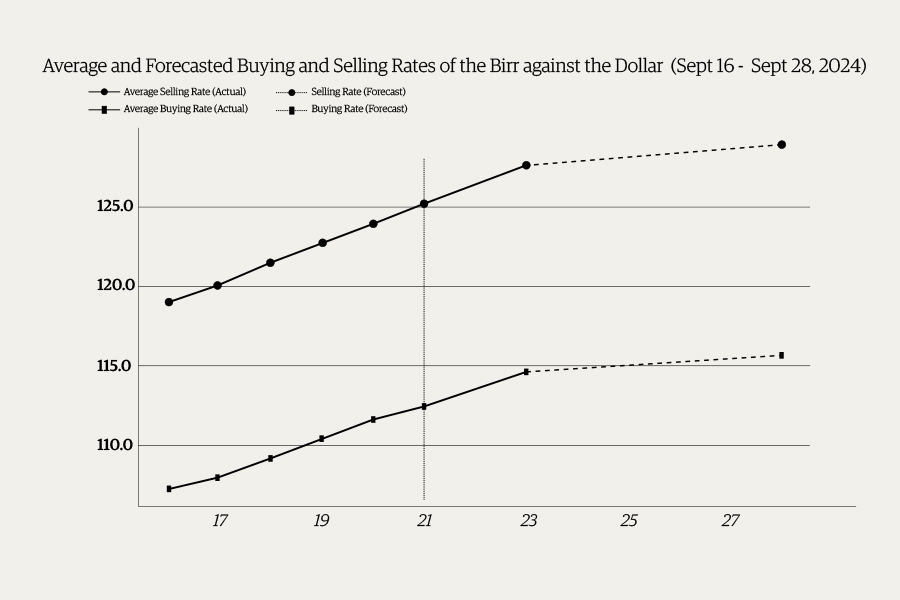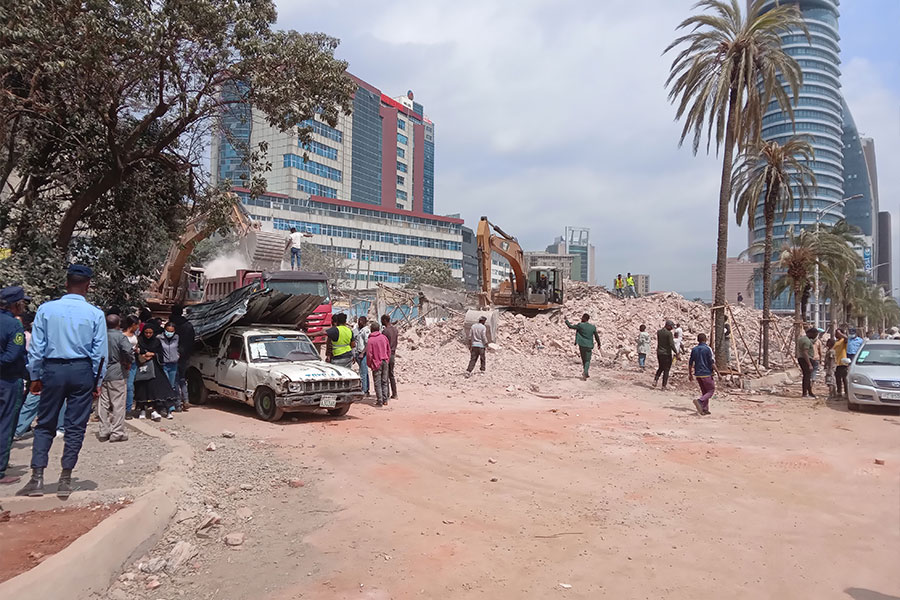
Fortune News | May 23,2021
Officials of the Addis Abeba City Administration are advancing a series of ambitious urban development initiatives, aspiring to transform the city into a "smart city," a vision championed by Prime Minister Abiy Ahmed (PhD). The structural development studies are slated for completion by the end of May.
The city's authorities have temporarily banned issuing new building permits and land-related administrative services for the past month in districts such as Bole, Nifas Silk Laphto, Qirkos, and Yeka. It is part of a city-wide measure "to ensure that new constructions align with the city’s comprehensive development plans, avoiding disputes with upcoming projects."
The initiative, guided by the city's Plan & Development Commission under the leadership of Commissioner Dadi Wedajo, involves extensive collaboration with local universities. Civil Service and Addis Abeba universities have been tasked with studying corridor development and Local Development Plans (LDP), respectively, reflecting a growing trend of integrating academic expertise in urban planning.
A notable component of the large-scale planning effort is the corridor development project that stretches 89hct from the Atlas Hotel through Edna Mall and Adey Abeba Stadium along Namibia to Djibouti streets. Another significant area under study is the 61.2hct expanse from the Capital Hotel to the Lem Hotel along Haile Gebresilassie Road to Equatorial Guinea Street. The studies hope to reshape these corridors into more pedestrian-friendly and economically vibrant areas.
The LDPs, on the other hand, cover various areas of the city, including the 52hct zone in the neighbourhood where the African Union (Au) is headquartered and a 137hct land in Woreda 01 near the Jemo Three area. The plans could propose new urban solutions such as car-free neighbourhoods, designated parking areas, expanded pedestrian and bicycle lanes, and residential, commercial, and recreational zone integration.
"Such comprehensive planning could transform the city’s landscape to accommodate its burgeoning population while maintaining green spaces,' said Yirsaw Zegeye, an urban planner from Bahir Dar University.
According to Yirsaw, while modernising urban areas with existing populations might be costlier in the short term, the long-term benefits of well-planned urban environments far outweigh these initial costs.
"These plans should prioritise the immediate needs of the residents," he said, echoing the sentiment of the city’s developmental ethos.
The Civil Service University, also involved in the corridor development study, has been allocated nearly six million Birr for its research efforts. Daniel Alaro (PhD), a lecturer and study team member, shared insights into the objectives of these studies.
“The city’s general infrastructure has been randomly scattered until now,” he said.
He urged for a more organised and integrated approach to urban development, disclosing that the study would address various critical issues, including the potential demolition of "substandard housing" and ensuring compensation for affected property owners.
"It'll be a human-oriented approach," Deribo told Fortune.
Prime Minister Abiy has often expressed his vision for "a greener, smarter, and more eco-friendly" Addis Abeba. Over the past two months, the city has been actively engaged in five corridor projects spanning 10Km and covering 47.5hct. The projects have involved massive resettlement and demolitions to make way for road infrastructure expansions, including increased pedestrian pathways and bicycle lanes.
Fekre Desalegn (Prof), the University's president and brother of former Prime Minister Hailemariam Desalegn, revealed that the corridor studies are conducted by a multidisciplinary team of sociologists, economists, and urban planners. The team’s experience with land use plans in other towns such as Asosa, Komobolcha, and Dilla towns, as well as another corridor around the Shiromeda area, has equipped them with the requisite skills for this expansive project.
“This is why we’ve been selected,” said Fekre, attributing it to the university’s track record.
Students and teachers from Addis Abeba Science & Technology University are contributing to the LDP studies. They have undertaken a grassroots approach, going door-to-door to assess infrastructure, land use, traffic flow, and utility access, following the standards outlined in the master plan.
Atnafu Morca, head of environmental development and planning at the Commission, believes that the LDP is a crucial tool in implementing the city’s structural plan, conceived nearly seven years ago. At that time, the estimated budget for implementing the plan was around 887 billion Br.
The Ministry of Urban Development & Construction had released a manual in 2019 for preparing and implementing Neighborhood Development Plans (NDP), a document designed to bridge the gap between broad structural plans and localised, functional and livable neighbourhood plans. It stressed the importance of community involvement in the planning process, advocating for a collaborative approach that ensures the plans reflect the aspirations and needs of residents.
The manual also addresses the integration of urban planning with broader national policies and strategies, which is thought to be crucial for ensuring that urban planning contributes to holistic national development. The historical context of Addis Abeba’s urban development also provides a backdrop to these new initiatives.
The city has evolved significantly since its establishment in 1886, undergoing various transformations from the era of Italian occupation, which introduced modern municipal services, to the post-1991 period marked by private sector involvement and foreign investment. These changes have expanded the city’s infrastructure and adjusted its socio-economic structures. The current planning is informed by history, addressing the shortcomings of previous plans and aligning with global practices in sustainable development and improved governance.
According to Atnafu, the decision to pause new permits is a precautionary measure to prevent additional costs that may arise from projects conflicting with the new plan during its implementation phase.
"The pause is part of a broader effort to ensure that development is sustainable and in line with the city’s long-term goals," he told Fortune.
The study areas include large population settlements, such as the 6,000 people near Qera Abbatoirs Enterprise in Woreda Five and over 8,000 people in Woreda One around the Jemo Three area. According to Atnafu, the project in the Jemo area serves as a vital strategy to address essential community needs while relieving pressure from the inner city. He said the decision to pause issuing new permits aims to prevent additional costs that may arise from projects conflicting with the new plan during implementation.
"It's a precautionary measure," Atnafu told Fortune.
Mesfin Alemu is the architect and urban planner in charge of the two teams conducting the LDP studies. The team also conducted two previous studies for the areas from Qera to Bulgaria and Gojam Berenda in Addis Ketema District last year. He observed that the main impediments for the nearly 180-member teams have been the lack of cooperation from residents unwilling to share information about their living status, income and family structure.
"The area behind the AU is a slum," Mesfin told Fortune. "It lacks adequate utilities and infrastructure."
Mesfin disclosed that the houses near AU were constructed before the 1970s and lacked the basic amenities necessary to serve the residents. They are characterised by horizontal sprawl rather than vertical construction that can accommodate a larger population. Mesfin disclosed that after the study is completed, the LDPs will serve as a blueprint for subsequent development projects in the area once they pass through the regulatory grill.
"How to attain a compact and smart city is the purpose of the study," he said.
PUBLISHED ON
May 11,2024 [ VOL
25 , NO
1254]

Fortune News | May 23,2021

Radar | Jan 19,2024

Fortune News | Dec 30,2023

Agenda | May 23,2020

Radar | Nov 16,2024

Money Market Watch | Sep 22,2024

Radar | Dec 05,2018

Radar | Nov 09,2024

Fortune News | Nov 03,2024

Radar | Jan 16,2024

Dec 22 , 2024 . By TIZITA SHEWAFERAW
Charged with transforming colossal state-owned enterprises into modern and competitiv...

Aug 18 , 2024 . By AKSAH ITALO
Although predictable Yonas Zerihun's job in the ride-hailing service is not immune to...

Jul 28 , 2024 . By TIZITA SHEWAFERAW
Unhabitual, perhaps too many, Samuel Gebreyohannes, 38, used to occasionally enjoy a couple of beers at breakfast. However, he recently swit...

Jul 13 , 2024 . By AKSAH ITALO
Investors who rely on tractors, trucks, and field vehicles for commuting, transporting commodities, and f...

Nov 1 , 2025
The National Bank of Ethiopia (NBE) issued a statement two weeks ago that appeared to...

Oct 25 , 2025
The regulatory machinery is on overdrive. In only two years, no fewer than 35 new pro...

Oct 18 , 2025
The political establishment, notably the ruling party and its top brass, has become p...

Oct 11 , 2025
Ladislas Farago, a roving Associated Press (AP) correspondent, arrived in Ethiopia in...